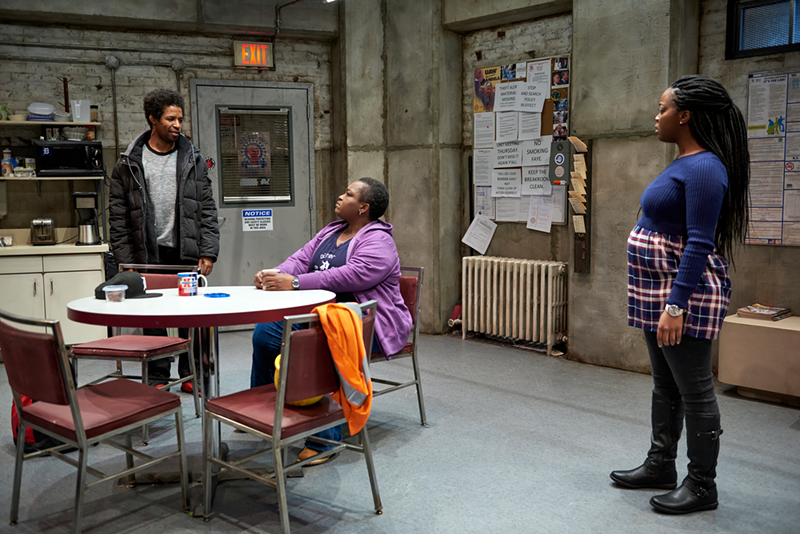It’s been a fine spring in Cincinnati for plays by noteworthy African-American playwrights: Cincinnati Shakespeare Company gave us a quality staging of August Wilson’s Fences, the Playhouse produced Wilson’s lyrical Two Trains Running and now Ensemble Theatre Cincinnati is presenting Dominique Morisseau’s Skeleton Crew. Morisseau is, in many ways, the heir apparent to Wilson’s storytelling legacy. Her work offers naturalistic, sometimes gritty stories of African-Americans in enlightening, often poetic, ways that transcend everyday circumstances to portray dignity, resolve and commitment.
Skeleton Crew is set entirely in the breakroom of an automotive stamping plant in Detroit. It’s late 2008 and the economy is cascading into the Great Recession. We meet three employees: Faye (Burgess Byrd), a respected veteran of 29 years who is the shop foreman for the UAW; Dez (Amari Cheatom), a rough-and-tumble guy; and Shanita (Ernaisja Curry), a young woman, pregnant and unmarried, but she’s admired for her intelligence and commitment to good work. The fourth character is Reggie (Brian Marable), their supervisor, who has a connection to Faye that is slowly revealed. It’s also the source of dramatic conflict.
Faye and Reggie’s late mother had a lesbian relationship, and Faye helped him on his upwardly mobile path. He has confided to her that the company’s situation is perilously close to layoffs, but he asks her to sit on the news — despite rumors swirling on the work floor — so he can do his best to help everyone weather the changes.
That’s especially challenging for Faye who follows her own strong-willed ways (especially with prohibited smoking and flaunting the signs Reggie keeps posting), and for Dez, who is insubordinate and suspected of possibly stealing parts. (He’s eager to start his own business.) Shanita is faithful and hardworking, even turning down an opportunity for a better job elsewhere because she’s loyal to the company. Reggie’s insistence that Faye remain silent presents a moral quandary for her own existence, as she nears retirement and lives in precarious circumstances after a battle with cancer. She also frets about her younger friends’ futures.
Director Stori Ayers has drawn out individual and ensemble performances that are both memorable and evocative. Cheatom’s Dez is not a one-dimensional bad boy; he softens enough to reveal his pride and desire to make something of himself, even if his stubbornness often trips him up. As Shanita, Curry is amusing in her haughty treatment of Dez and likable in her softening as she gets a better understanding of his issues. (She does have a wonderful rant about traffic on I-75 at the beginning of Act 2.)
At first, Marable’s Reggie seems wholly focused on upward mobility and doing things by the book. But Marable reveals Reggie’s depth and concern as he tries to do the right thing by each of the workers he manages.
As Faye, Byrd is Skeleton Crew’s solid, admirable anchor, a deeply caring woman struggling to hang on and who makes sure others are treated fairly. Byrd adeptly conveys Faye’s humorous, down-to-earth nature, but she also slowly reveals tremendous vulnerability and willingness for self-sacrifice.
Brian c. Mehring’s scenic and lighting design — the grungy break room, complete with lockers, bulletin boards, linoleum floor, a fridge festooned with stickers and a couch long enough to sleep on — is lit variously from a harsh fluorescent glare to moody scene-ending black-outs that underscore emotional moments.
Enhancing the transitions between scenes (and projected on overhead windows that perhaps look out on the shop floor) is video content choreographed by Darnell Pierre Benjamin, where silhouetted figures of hard-hatted workers sometimes engage industrially and other times in celebration or desperation.
While Skeleton Crew is set in a very specific time and place, it’s also a deeply human show that portrays desires and conflicts that will move audiences regardless of their experience. It should come as no surprise that this play is one of the 10 most-produced works on American stages this season. It’s hard to imagine a better production than the one currently onstage at ETC’s Over-the-Rhine facility.
Early in 2020 Ensemble will produce Pipeline, another script by Morisseau. It’s good news that this excellent playwright has found a Cincinnati theater committed to presenting her work.
Skeleton Crew, presented by Ensemble Theatre Cincinnati, continues through May 11. More info/tickets: ensemblecincinnati.org.







